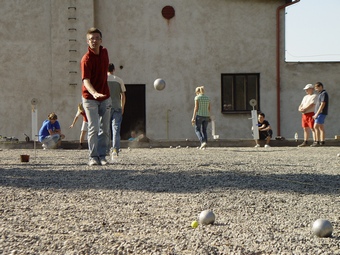Publikace, nahrávky a jiné výstupy
Přehled toho, co jsem napsal a zveřejnil (jako sociolog) nebo nahrál a vydal (jako muzikant). Prostě veřejně dostupné "výstupy". V případě, že je to právně a technicky možné, postupně sem dávám k dispozici i plné texty a do příslušných oddílů hudební sekce pak i nějaké hudební ukázky ve formátu mp3.
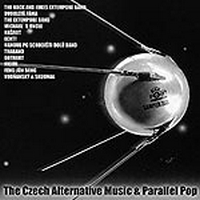
V/A (2002): Black Point sampler 2001. CD. Black Point [BP01322]
[BP01322]
::::"... Ucelený přehled o loňské produkci vydavatelství přináší Black Point Sampler 2001. Reprezentativní výběr zachycuje čtrnáct skladeb kapel a interpretů, kteří se v loňském roce dočkali samostatného alba. Výběr je to skutečně pestrý a hudba kvalitní. Vedle archivních záznamů alternativních skupin 80. let (Dvouletá fáma, The Extempore Band, Michael´s Uncle) nabízí etnickou a world music (Gothart, Nigun, Feng-Jun Song), pubrockový Echt!, bigbítové Schodiště, hořkosladké popěvky dvojice Vodňanský Skoumal či říznou kramářskou dechovku v podání Trabandu. Vše v nejvyšší kvalitě a originálním pojetí. Sampler dokazuje, že loňský rok se Black Pointu vydařil a alba Echt!u, Schodiště, Trabandu, Extempore, Nigunu či Gothartu patří k ozdobám hudebního trhu." (Karel Souček)
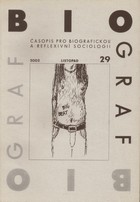
LATOUR, B. (2002): Když věci vracejí úder: Co mohou sociálním vědám přinést "vědní studia". Biograf , (29): 3-20 - přeložil Zdeněk Konopásek
, (29): 3-20 - přeložil Zdeněk Konopásek
::::The contribution of the field of science and technology studies (STS) to mainstream sociology has so far been slim because of a misunderstanding about what it means to provide a social explanation of a piece of science or of an artefact. The type of explanation possible for religion, art or popular culture no longer works in the case of hard science or technology. This does not mean, it is argued, that science and technology escapes sociological explanation, but that a deep redescription of what is a social explanation is in order. Once this misunderstanding has been clarified, it becomes interesting to measure up the challenge raised by STS to the usual epistemologies social sciences believed necessary for their undertakings. The social sciences imitate the natural sciences in a way that render them unable to profit from the type of objectivity found in the natural sciences. It is argued that by following the STS lead, social sciences may start to imitate the natural sciences in a very different fashion. Once the meanings of "social" and of "science" are reconfigured, the definition of what a "social science" is and what it can do in the political arena is considered. Again it is not by imitating the philosophers of science's ideas of what is a natural science that sociology can be made politically relevant.
LATOUR, B. (2000): When things strike back: A possible contribution of "science studies" to the social sciences. The British Journal of Sociology, 51 (1): 107-123
KONOPÁSEK, Z. / KUSÁ, Z. / STOCKELOVÁ, T. / VAJDOVÁ, Z. / ZAMYKALOVÁ (2002): Czech Republic - a national profile. Research report of the Public Accountability European Research Project, CT2001-00076. Praha. Dostupné na adrese http://zdenek.konopasek.net/docs/WP1_Czech.pdf
::::
KONOPÁSEK, Z. (2002): Dejme smysl volební neúčasti. MF Dnes. 7. června, str. A/9. Rukopis dostupný na adrese http://zdenek.konopasek.net/archiv/texty/neucast.htm
::::
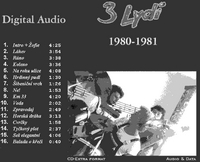
3 Lydi (2001): 3 Lydi 1980-1981. CD. Vydáno vlasntím nákladem Milana Voříška
::::Domácí nahrávky pořízené na kazetový magnetofon, shrnující "vrcholnou" podobu téhle kapely z jara 1981.
[hudební ukázky zde]
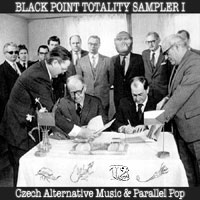
V/A (2001): Black Point totality sampler. CD. Black Point [BP 0128-2]
[BP 0128-2]
::::"Zcela ojedinělá kompilace songů, které vznikaly v Čechách a na Moravě v dobách tuhé normalizace. Přestože z většiny skladeb dýchá dusná a temná atmosféra oněch dob, lze z většiny slyšet také vzdor a vůli po svobodě vyjádření, která byla tehdejším komunistickým pohlavárům nejvíce proti srsti." (Black Point)

DVOULETÁ FÁMA (2001): Studio 1983/Live 1988 (2CD). Black Point [BP-0012-2]
[BP-0012-2]
::::"Toto dvojcédéčko zahrnuje jednak vlastním nákladem vydanou studiovou nahrávku z roku 1983, jediné album Dvouleté fámy, a jednak dvě živé nahrávky z roku 1988. Kapely, které se na těchto dvou discích představují, jsou dost odlišné a není vlastně moc na místě, když nesou stejné jméno. V roce 1983 byla Dvouletá fáma čtveřicí muzikantů ve složení Zdeněk Konopásek (bicí), Martin Vik (kytara), Jana Machácková (zpěv) a Ivan Benda (baskytara). Kapela hrála složitě vystavěné novovlnné písničky, které lze řadit někam mezi Talking Heads, Pere Ubu a Art Bears. Studiová nahrávka z roku 1983 hýři vtipem a půvabem. Vikova drnkavá a jakoby rozladěná kytara skvěle pasuje na hravé zpívání Macháčkové (které někomu může připomínat Haco z After Dinner). Živé nahrávky z roku 1988 představují už něco docela jiného - náročnějšího, ale stále velmi pozoruhodného. Z původní sestavy zůstali pouze Konopásek s Vikem. Na prvních 14 stopách (nahraných 12. června 1988) hrají v triu spolu s básníkem a hercem Radomilem Uhlířem. Posledních šest písní (datum není přesně určeno, ale jde patrně o nahrávky několik měsíců pozdější) vystupuje s kapelou ještě basista Josef Ferda Matousek. Tyto písně nás zavádějí do mnohem temnějších světů, je v nich hodně improvizace a vévodí jim Uhlířova divadelní (a často absurdní) deklamace. Zatímco ti, kdo nemluví česky, si jistě skrznaskrz užijí první disk, je zcela jasné, že na druhém disku jim nutně uniká podstatný rozměr. I tam jsou ale pozoruhodné pasáže. Celkovou náladou připomíná MCH Band Mikoláše Chadimy. Nahrávky byly pro toto vydání skvěle remastrovány, takže Studio 1983 & Live 1988 patří k tomu nejpozoruhodnějšímu, co v archivní edici Black Pointu kdy vyšlo."
François Couture, All-Music Guide [hudební ukázky zde]
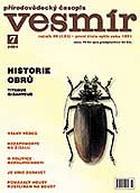
LATOUR, B. (2001): Nepřehlédněme žížalu Pontoscoles corethrurus. Vesmír, 80 (7): 383-85 - přeložili Zdeněk Konopásek a David Storch
::::Překlad článku: LATOUR, B. (nedat.): Let’s us not overlook the earthworm Pontoscolex corethrurus. Rukopis, dostupné na adrese http://bruno.latour.fr
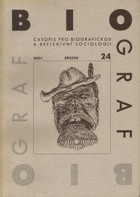
FINE, G.A. (2001): Jak se dělá příroda a ochočuje divočina: Problém "vysbírávání" lesů v houbařské kultuře. Biograf , (24): 29-56 - přeložil Zdeněk Konopásek
, (24): 29-56 - přeložil Zdeněk Konopásek
::::Although nature often has been treated as an unproblematic reality, I argue for treating it as a contested concept, suggesting that "nature" is a cultural construction. Drawing on interactionist and ecological theory, I claim that the creation of social problems involving the environment is inevitably grounded in cultural choices. Through a set of ideological structures (a protectionist vision, an organic vision, and a humanistic vision), social actors develop templates for understanding the proper relationship between humans and nature. Based on an ethnography of mushroom collecting, I contend that these models lead us to experience nature through cultural eyes - wishing to be away from civilization, to be at one with nature, and to engage in the pragmatic use of nature for personal ends. Conflicting stances toward nature account for debate over the moral acceptability of the commercial collection of mushrooms and the "problem" of overpick. Templates of human-environmental interaction, leading to models for experiencing the wild, provide the basis for understanding the conditions under which environmental change is defined as a social problem.
FINE, G.A. (1997): Naturework and the taming of the wild: The problem of "overpick" in the culture of mushroomers. Social Problems, 44 (1): 68-88

ASHMORE, M. / REED, D. (2001): Nevinnost a nostalgie v konverzační analýze: dynamické vztahy mezi nahrávkou a jejím přepisem. Biograf, (25): 3-23 - přeložili Lenka Buštíková, Zdeněk Konopásek a Ivan Vodochodský
::::This paper attempts an analysis of some of the methodological practices of Conversation Analysis (CA); in particular, tape recording and transcription. The paper starts from the observation that, in the CA literature, these practices, and the analytic objects they create (the tape and the transcript), are accorded different treatment: simply put, for CA the tape is a "realist" object, while the transcript is a "constructivist" one. The significance of this difference is explored through an analysis of the dynamics of CA practice. We argue that the "constructivist transcript" is premised on an understanding of CA as predominantly concerned with maximising its "analytic utility": a concern of one distinct temporal stage of CA work: that of the "innocent" apprehension of objects in the "first time through". The "realist tape", in contrast, is based on a different aspect of the work of CA: its quest for greater "evidential utility", achieved by the "nostalgic" revisiting of previously produced objects for purposes of checking them against each other; work done in the "next time through". We further argue that both the ontology and the epistemology of CA[a]s objects are changed in any next time encounter. We conclude with a cautionary speculation on the currently-projected, transcript-free, digital future of CA.
ASHMORE, M. / REED, D. (2000): Innocence and nostalgia in conversation analysis: The dynamic relations of tape and transcript. Forum Qualitative Sozialforschung / Forum: Qualitative Social Research, 1(3): 45 odst., čl. 3. Dostupné na adrese http://nbn-resolving.de/urn:nbn:de:0114-fqs000335
